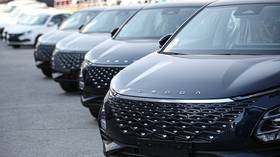US war on Chinese electric cars has begun
American industries are trailing behind, but Biden will leverage protectionism to win the 2024 election
By Timur Fomenko, political analyst
The Biden administration has announced that it’s launching a probe into Chinese “smart cars,” vowing to protect the American automobile industry. As is conventional, the White House branded the cars a “national security threat” and claimed, baselessly, that they can transmit data back to China.
Of course, any seasoned and good-faith observer should know that the rhetoric of “national security threats” is always used as a justifying premise, often without evidence, in order to blacklist a given Chinese product or service and merit its exclusion from the American market. Hence Huawei among other Chinese companies has also been treated similarly.
This rhetoric has often been borderline hysterical, one of the recent examples being Florida Senator Rick Scott saying that Chinese-exported garlic was a national security threat. That may be an outlier, but when it comes to technology, anything and everything from China is usually accused of espionage, with the political consensus of paranoia being used to justify such harsh policy measures.
In reality, the Biden administration’s foreign policy is to attempt to block China’s technological and industrial advancements in order to stop Beijing moving up the global value chain and eroding American dominance of key industries, and thus undermining the hegemony of the US. Most prominently, the White House has been focused on attempting to crush the Chinese semiconductor industry, weaponizing an ever-growing scale of export controls to try and deprive Chinese companies from access to advanced semiconductors and associated manufacturing equipment. US National Security Advisor Jake Sullivan has called this a “small yard, high fence” strategy.
The US is famously protectionist about its automobile industry on all fronts, and is tough on both friends and foes alike over it. In the past few years, there has been a political push to advance the renewable energy industry, which has led to a surge in demand for electrical cars, batteries, solar panels, and other goods throughout the world. As it happens, China has positioned itself as the largest single manufacturer and exporter of renewables on the planet by a mile, and has overtaken Japan to become the world’s largest car exporter. Demand for Chinese electric cars is booming.
Although Chinese-made cars are subject to a 25% tariff in the US already, the competitive and cheaper prices of such models mean this serves as little deterrent and their numbers are growing. Not only that, but China has been able to exploit loopholes by initiating manufacturing of its vehicles in Mexico, allowing the cars to get inside of the North American Free Trade Agreement (NAFTA) and thus experience even less of a tariff. This is putting political pressure on the Biden administration, which, with an election coming up, will naturally be inclined to demonstrate toughness against China in the coming months.
This is because he will face a political opponent who is calling to be even tougher on China and has already, in his previous presidency, changed the conversation of American economic policy towards protectionism. In other words, Biden will be politically pressured to pay lip service to Trumpist economic ideas in order to offset Trump himself. To get the votes of American workers, he needs to show that he is fighting for American jobs, therefore targeting Chinese electric vehicles is going to be on the agenda. You might add that key automobile manufacturing states, such as Michigan, can win or lose the election for him, and this cost Hillary Clinton the 2016 election.
Of course, because of that, the White House is also diving into anti-China hysterics, including by saying that Beijing will remotely control electric and smart cars to shut down US roads and systems, among other things. It is the characteristic of American politics to utilize smears, fear and hysteria in order to manufacture consent for policies, especially in today’s polarized environment. So, even though things have been calm on a high level between the US and China in the first quarter of 2024, we can expect this year to become turbulent and unpredictable, as it did in 2020, albeit without the even more chaotic situation of the Covid-19 pandemic. But either way, on a macro level, the US also doesn’t want China to dominate global industries or, as Biden put it, “the technologies of the future.” Therefore, while the US trails China immensely in the manufacturing of electric vehicles, it is likely to take measures in order to protect its own markets.
The statements, views and opinions expressed in this column are solely those of the author and do not necessarily represent those of RT.
You can share this story on social media:








Comments are closed.